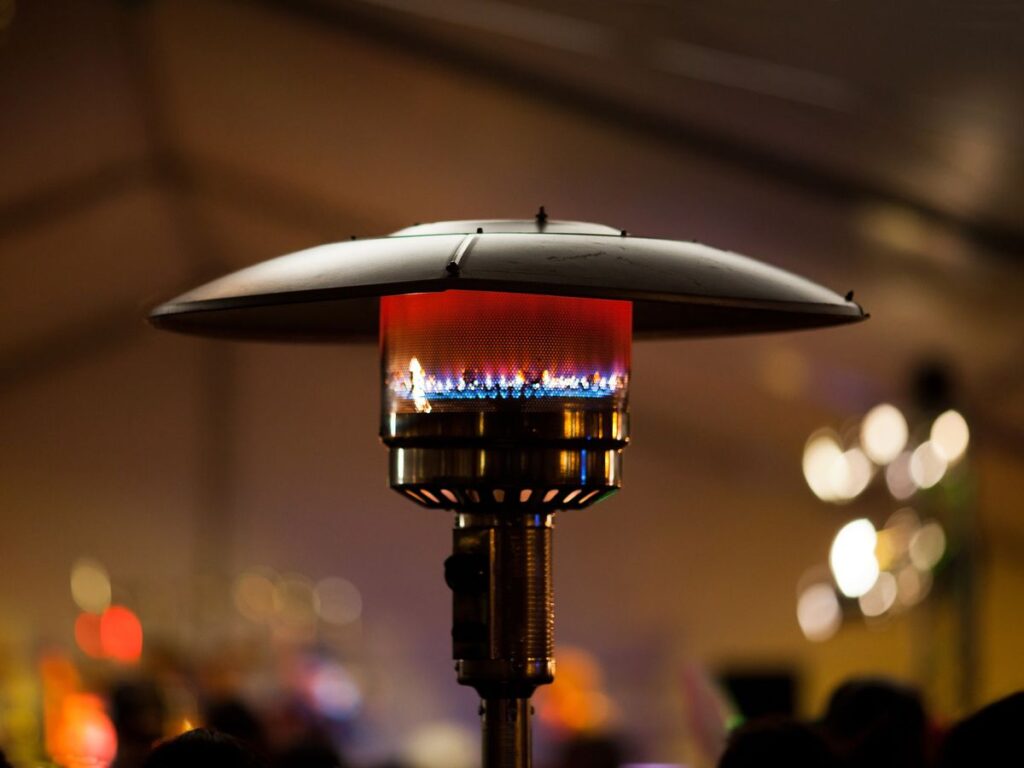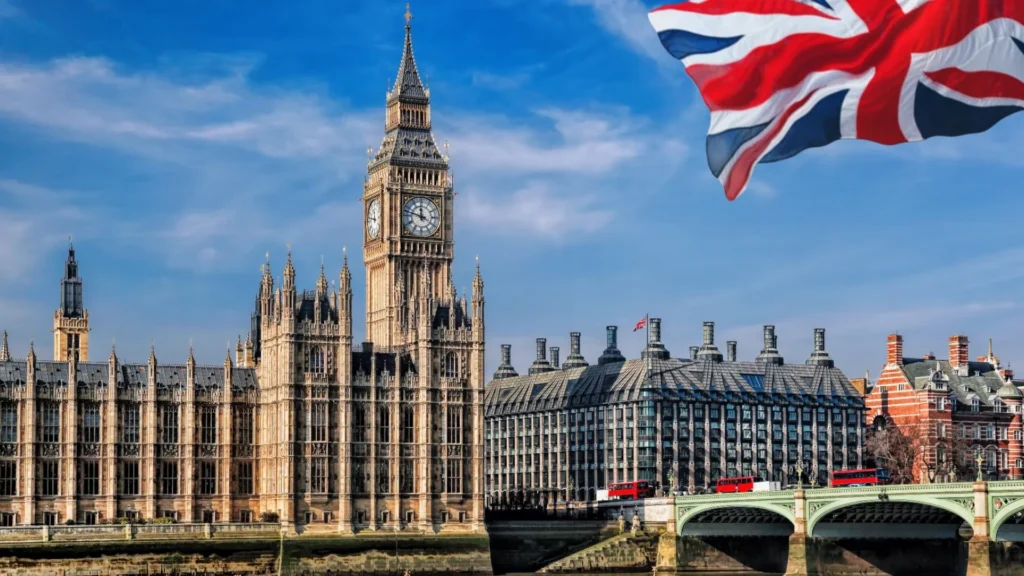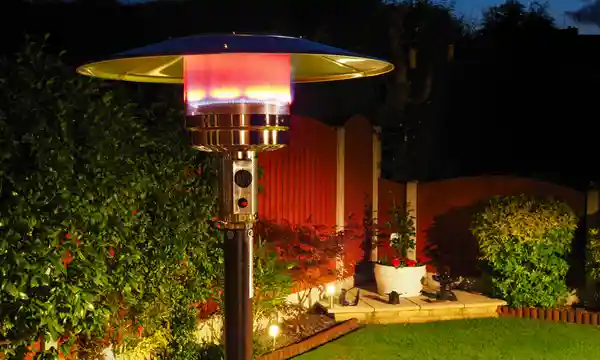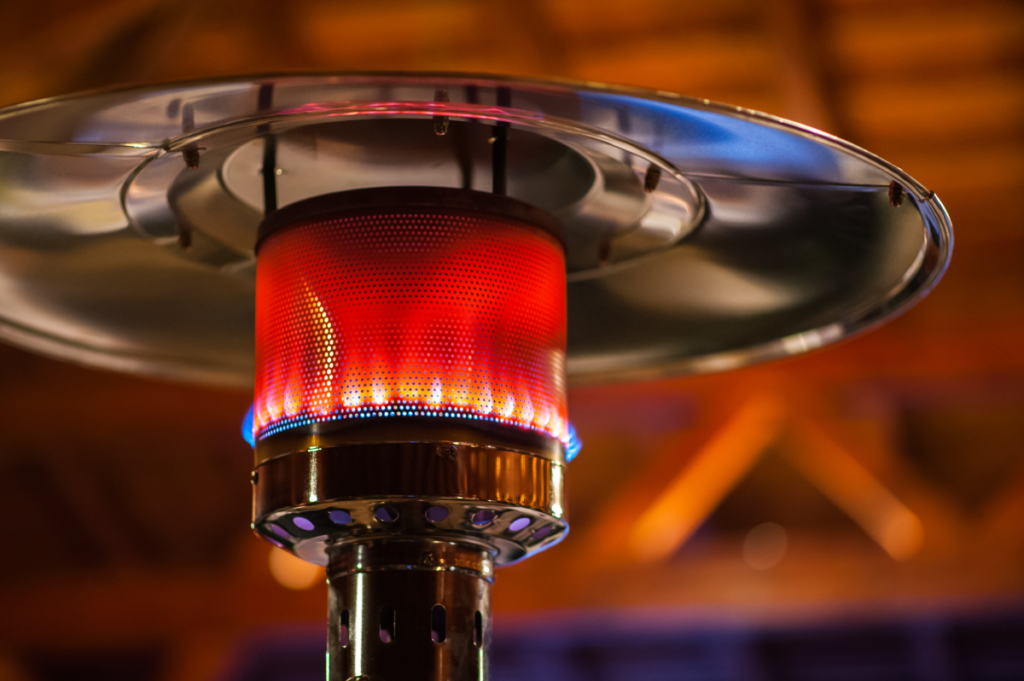Overview of Patio Heaters
Patio heaters are a popular way to add warmth to outdoor spaces, especially during the colder months. However, they have also become a topic of concern due to their impact on the environment. The use of patio heaters contributes to carbon dioxide emissions, which is one of the leading causes of the climate crisis. Many experts have called for action on the use of patio heaters, and some places have already banned them. This article will explore the issues with patio heaters, their impact on the environment, and the measures being taken to address the issue.
The Issues With Patio Heaters

Patio heaters have become a controversial topic due to the environmental and health concerns they raise, as well as their impact on energy efficiency and sustainability. Many experts have pointed out the negative effects that these outdoor heaters have on the environment, and as a result, debates and discussions have emerged regarding their use.
One of the most significant issues related to patio heaters is the negative impact they have on the environment. Burning fossil fuels such as propane or natural gas to fuel these heaters releases large amounts of carbon dioxide and other greenhouse gases into the atmosphere, contributing to the acceleration of climate change. Other environmental concerns involve the waste of energy and resources, which result in additional harm to the environment.
The usage of patio heaters also poses a significant health risk, especially in residential areas. They can cause respiratory problems, as well as headaches and dizziness, due to the toxic fumes that they emit. These fumes can also be harmful to animals and plants in the surrounding area.
Energy efficiency and sustainability are also issues that are linked to patio heaters. The energy consumed by patio heaters is deemed inefficient, given that the warmth they generate is limited to an immediate surrounding area while leaving the overall environment unheated. This represents a waste of energy, which is especially significant for countries dependent on fossil fuels. Given the concerns related to energy efficiency and sustainability, we urgently need to explore alternative methods for heating outdoor spaces.
Various types of patio heaters are available in the market, including gas-burning patio heaters, electric patio heaters, wall-mounted patio heaters, and radiative heaters. Electric patio heaters are the most sustainable option because they do not emit greenhouse gases and consume less energy. Gas-burning patio heaters are the most popular option, but they are also the most energy-intensive and not the most sustainable. Wall-mounted heaters and radiative heaters are more energy efficient as they operate on electricity and cater to large outdoor spaces.
Overall, patio heaters present a range of environmental, health, and sustainability concerns, which have led to discussions and debates on their usage. We must explore alternative methods for heating outdoor spaces and invest in more sustainable options to mitigate the impact that these heaters have on our environment.
Are Patio Heaters Banned in the UK?

Patio heaters have come under the spotlight due to their contribution to carbon emissions and the use of fossil fuels. The UK government has taken a stance on this by encouraging the use of alternative heating methods and implementing standards for energy efficiency. Regarding patio heaters, the government has not issued a national ban, but several cities such as London and Cambridge have taken individual initiatives to ban them in outdoor spaces. Other countries such as France and Ireland have imposed national bans on the use of patio heaters, recognising their detrimental impact on the environment.
Carbon Emissions & Fossil Fuels
Carbon emissions from patio heaters are a result of burning fossil fuels, such as natural gas or propane. These fuels release carbon dioxide into the atmosphere, contributing to the greenhouse gas emissions that drive climate change. Inefficient combustion of fossil fuels can release other air pollutants, such as carbon monoxide and nitrogen oxides, which can also harm the environment.
There are various types of patio heaters available in the market, and some of them release more carbon emissions than others. For instance, gas guzzling patio heaters, which are often used in the hospitality sector, are one of the leading contributors to carbon emissions. Electric heaters, on the other hand, tend to be more energy-efficient and have lower carbon footprints. Other types of patio heaters that have high carbon footprints include wall-mounted patio heats with additional heaters, radiative heaters, and portable propane heaters. Usage patterns also play a role in determining a patio heater’s carbon footprint.
Fossil fuels are inherently inefficient, and using them to power patio heaters only exacerbates the environmental impact. The use of fossil fuels for patio heating can lead to energy waste, and carbon emissions contribute to the climate crisis. The inefficient combustion of fossil fuels produces particulate matter, which can harm the respiratory system and increase the risk of heart disease.
Several data sources provide evidence about the environmental consequences of fossil fuel-based patio heaters. For instance, a study by climate change expert Fiona Hall reveals that patio heaters can emit more than 200 times as much carbon dioxide as plasma televisions. Another study conducted in 2018 found that the use of patio heaters in outdoor dining at Punch Taverns alone could result in over 1,500 tonnes of carbon dioxide emissions each year.
Overall, it is evident that the use of fossil fuel-based patio heaters contributes significantly to carbon emissions and impacts the environment negatively. Reducing usage patterns and switching to more energy-efficient alternatives such as electric patio heaters and solar panels can help reduce carbon emissions, contribute to energy efficiency, and potentially mitigate the consequences of climate change.
What Does the UK Government Say?

The UK government has been taking action on patio heaters and their impact on the environment. In recent years, the government has introduced a range of measures to reduce carbon emissions, and patio heaters have been included in these efforts.
One of the most significant actions the government has taken is to ban certain types of domestic patio heaters outright. Since 2009, it has been illegal to sell or lease patio heaters that use excessive amounts of energy and produce high carbon emissions. The government has set standards for energy efficiency that all outdoor heaters must meet, meaning that only the most efficient heaters are permitted for sale in the UK.
In addition to the legal ban on certain types of patio heaters, the UK government has also released official guidelines and recommendations for individuals and businesses on how they can reduce their carbon footprint when heating outdoor spaces. These guidelines include choosing energy-efficient heaters, using them only when necessary, and ensuring they are maintained and installed correctly to optimize energy use.
Furthermore, the UK government has offered funding and incentives to encourage businesses to adopt more environmentally friendly outdoor heating options. For example, the government has launched schemes to support the installation of solar panels, which can be used to power outdoor heaters, reducing their carbon footprint. The government has also provided grants and other incentives to encourage businesses to switch to electric or other low-carbon options.
In conclusion, the UK government is taking action on patio heaters and their impact on the environment. Laws and regulations have been put in place to ban inefficient types of patio heaters, while official guidelines and recommendations aim to reduce carbon emissions from outdoor heating. Furthermore, funding and incentives are available to encourage individuals and businesses to adopt more energy-efficient heating solutions. By working together, we can help reduce greenhouse gas emissions and mitigate the consequences of climate change.
Other Cities and Countries That Have Banned Patio Heaters

Patio heater bans are not unique to the UK – several other countries and cities have also taken action to restrict or ban the use of these outdoor heating devices. The reasoning behind each decision varies, but in general, these bans are meant to reduce carbon emissions and mitigate the effects of climate change.
One country that has banned patio heaters is France. In 2020, the country passed a law that effectively prohibits the use of outdoor heating devices at cafes and restaurants. The goal of this legislation is to reduce the country’s carbon emissions and encourage businesses to focus on creating indoor or covered outdoor spaces for diners instead.
In the United States, several cities have also banned or restricted the use of patio heaters. For example, in 2020, the city of Chicago passed an ordinance that prohibits the use of natural gas-powered patio heaters on restaurant patios. In Los Angeles, the city council passed a resolution in 2021 supporting a statewide ban on gas-powered leaf blowers and considering a ban on gas-powered outdoor heaters.
Other cities that have implemented patio heater bans or restrictions include Toronto, Canada, which banned the use of gas-powered patio heaters in 2020, and Sydney, Australia, which has had a ban on these devices in outdoor dining areas since 2007.
It’s worth noting that there are alternatives to traditional patio heaters, such as electric or solar-powered heaters, that can be used in some circumstances. Some locations that have implemented bans or restrictions have also provided funding or incentives for businesses to switch to these alternative options.
Overall, the trend towards patio heater bans reflects a growing awareness of the impact of carbon emissions on the environment and a desire to take action to mitigate the effects of climate change.
Why Have Patio Heaters Been Banned?

Patio heaters have become a target for environmentalists and climate change experts due to their contribution to carbon emissions. It has been estimated that a single gas-burning patio heater emits up to 4.7 tonnes of carbon dioxide per year, which is equivalent to what an average car produces in a year. Fiona Hall, a climate change expert, argues that patio heaters are a waste of energy and resources and that their use contributes to the climate crisis. Similarly, Eric Johnson, an environmentalist, believes that there should be energy efficiency standards for outdoor heating to reduce the impact of patio heaters on the environment.
Climate Crisis & Tons of Carbon Dioxide Emissions
Patio heaters have become a well-known contributor to the climate crisis through their significant carbon dioxide emissions. On average, a single gas-burning patio heater can produce up to 4.7 tonnes of carbon dioxide annually, making it a substantial source of greenhouse gas emissions. These carbon emissions have a considerable impact on the environment, leading to climate change and its associated consequences.
The heating of outdoor spaces has steadily become a major contributor to greenhouse gas emissions due to the increased usage of patio heaters. It is therefore essential to focus on taking measures to reduce their usage to mitigate the impact on climate change. By reducing carbon emissions, we can minimize the effects of climate change and safeguard the planet’s future for future generations.
The consequences of climate change have far-reaching and devastating effects, including the loss of habitats and the extinction of species. Additionally, there are negative impacts on human health through increased air pollution, severe weather events like hurricanes and wildfires, and rising sea levels that threaten coastal regions. However, these consequences can be prevented by taking proactive measures to reduce carbon emissions.
Therefore, it is crucial to address the negative impact of outdoor heating on the environment as part of global efforts to combat climate change. By reducing the usage of patio heaters and encouraging the use of sustainable alternatives, such as energy-efficient electric patio heaters or solar panels, we can take a step towards reducing carbon emissions and combating climate change. Ultimately, this will help us prevent the dire consequences of the climate crisis for our planet and its inhabitants.
Fiona Hall, Climate Change Expert’s Viewpoint on Heaters

Fiona Hall is a respected Climate Change expert who has worked extensively on the issue of greenhouse gas emissions and their impact on the environment. She has been vocal about her stance on the use of patio heaters, highlighting the significant impact these gas-guzzling heaters can have on the environment.
With her professional background and expertise in the field of Climate Change, Fiona Hall has been a leading voice in the call to ban patio heaters. She argues that these heaters are a major contributor to greenhouse gas emissions and a threat to the environment.
Fiona Hall’s key arguments and insights are centered around the fact that gas-burning patio heaters emit tons of carbon dioxide annually. The continued use of these heaters will lead to an increase in greenhouse gas emissions, exacerbating the effects of climate change. The impact of the climate crisis is far-reaching and can have devastating consequences, including rising sea levels and extreme weather events such as hurricanes and wildfires.
If action is not taken on patio heaters, the hospitality industry and outdoor spaces will continue to be a significant contributor to greenhouse gas emissions. Fiona Hall stresses the importance of reducing carbon emissions to mitigate the impact of climate change and safeguard the future of the planet.
In conclusion, patio heaters have been a long-standing issue that requires significant attention from experts like Fiona Hall. Her viewpoint on the impact of patio heaters on the environment is informed by her professional background and expertise in the field of Climate Change. The call to ban patio heaters is essential to reduce greenhouse gas emissions and prevent the dire consequences of climate change.
Eric Johnson’s Viewpoint on Energy Efficiency Standards for Outdoor Heating

Eric Johnson is a national expert reviewer with a vast knowledge of energy efficiency standards for outdoor heating. His extensive expertise in the field of energy efficiency makes him a leading voice in advocating for significant changes to current outdoor heating practices.
According to Johnson’s perspective, energy efficiency standards for outdoor heating are necessary to reduce carbon emissions and promote sustainable practices in the hospitality industry. His proposal advocates for the use of energy-efficient outdoor heating systems that meet specific standards for energy efficiency.
The implementation of Johnson’s proposed energy efficiency standards would significantly impact the use of outdoor heating. For example, electric patio heaters, which consume less energy compared to gas-burning patio heaters, would be preferred. Additionally, controlling and regulating the usage patterns of outdoor heating systems would be necessary to reduce energy waste and lower carbon emissions.
By reducing carbon emissions from outdoor heating, Johnson believes that energy efficiency standards could potentially help mitigate the impact of climate change. Reducing carbon emissions is crucial to curbing the effects of climate change, such as rising temperatures, severe weather events, and disrupted ecosystems.
However, there are both pros and cons to implementing such energy efficiency standards. One of the benefits is that implementing such standards would promote sustainable practices in the hospitality industry, and significantly reduce carbon emissions. However, some businesses may find it expensive to upgrade their existing outdoor heating systems to meet the proposed standards, which could be a significant challenge for a large section of the industry.
Furthermore, the feasibility of these proposed standards should be evaluated, taking into account the financial implications, and the practicality of implementing such standards. Though it is a daunting task, the hospitality industry must strive to meet Johnson’s proposed energy efficiency standards for outdoor heating to prioritize reducing their carbon footprint and mitigating the impact of climate change.
Alternatives to Gas-Guzzling Patio Heaters
Gas-guzzling patio heaters have long been a staple in outdoor dining and entertainment spaces, but the increasing concern about climate change has led authorities to look into alternatives that are more environmentally friendly. One possible solution is the use of electric and domestic patio heaters. In this section, we will look at whether these options are viable, as well as discuss the normal usage patterns for electric heaters in relation to activities such as outdoor dining and watching plasma televisions.
Electric and Domestic Patio Heaters: A Viable Option?
Gas-patio heaters are facing stricter regulations due to their damaging effect on the environment. Electric and domestic patio heaters have emerged as a promising alternative, especially due to their lower carbon emission and improved energy efficiency.
Electric patio heaters offer an eco-friendly alternative that eliminates the need for kerosene, propane or natural gas. They are cost-effective, easy to use and maintain. Although they consume electricity, they still offer a more sustainable option, producing 90% less carbon dioxide than gas patio heaters.
Domestic patio heaters are available in different sizes and designs to fit any outdoor space. Tabletop patio heaters are portable and fit perfectly on small tables while standing patio heaters have a broader heating range and provide more warmth. Wall-mounted patio heaters are sturdy and take up minimal space, and additional heater hoods are suitable for outdoor dining and relaxation.
Another alternative to consider is purchasing solar-powered patio heaters. These eco-friendly outdoor heaters harness energy from the sun, reducing the carbon footprint and reducing energy costs. Solar-powered patio heaters work by absorbing energy from the sun with on-board coils, and then gently releasing the warmth, creating a warm glow that is perfect for outdoor dining and entertainment.
Overall, electric and domestic patio heaters offer an alternative that is not only environmentally friendly but also practical and cost-effective. Consider investing in solar-powered patio heaters for a greener option that embraces sustainable energy.
Normal Usage Patterns for Plasma Televisions & Outdoor Dining with Electric Heaters
Normal usage patterns for plasma televisions and outdoor dining with electric heaters can have a significant impact on energy efficiency and carbon emissions. Plasma televisions often consume more energy than other types of TVs, so it is important to be mindful of how long they are used and when they are turned off to save energy. When it comes to outdoor dining with electric heaters, the amount of energy used depends on the size and number of heaters, as well as the duration of use.
In terms of energy efficiency, using electric heaters for outdoor heating has a clear advantage over gas-guzzling patio heaters. Electric heaters do not emit harmful gases like carbon monoxide and release 90% less carbon dioxide than gas-powered heaters. Furthermore, electric heaters convert about 98% of the energy they consume into heat, making them more efficient than gas heaters, which convert only about 45% of their energy into heat.
Despite their benefits, there are some drawbacks to using electric heaters for outdoor heating. The initial cost of purchasing and installing electric heaters may be higher than other options, and they cannot create the same warm, cozy atmosphere as the flickering flame from gas heaters. In addition, electric heaters rely on electricity, which can be affected by power outages and electricity costs.
One alternative source of energy to consider for outdoor heating is solar panels. Solar-powered outdoor heaters harness energy from the sun, making them completely independent of fossil fuels and reducing the carbon footprint. Although they may have a higher initial cost, solar panels are a long-term investment that can save money in the long run while promoting sustainability.
In conclusion, understanding normal usage patterns for plasma televisions and outdoor dining with electric heaters is important for maximizing energy efficiency and reducing carbon emissions. While electric heaters offer many benefits, solar panels present a sustainable alternative that should be considered for outdoor heating.
Conclusion
In conclusion, this article has presented a detailed analysis of outdoor heating options and their impact on carbon emissions and energy efficiency. Throughout the article, we’ve explored the benefits and drawbacks of using different types of patio heaters, highlighting the significance of making sustainable choices to combat the climate crisis.
While domestic models of patio heaters are not currently banned in the UK, there has been a push to phase out gas-burning patio heaters in the hospitality sector due to the high carbon emissions they produce. The UK government is now considering a ban on gas-powered outdoor heaters, following in the footsteps of other countries such as France and Spain, where patio heater bans are already in place.
Alternative heating options, such as electric heaters and solar-powered panels, offer a sustainable solution that can significantly reduce carbon emissions. Solar-powered outdoor heaters, for instance, are an excellent choice for outdoor heating as they harness energy from the sun, reducing reliance on fossil fuels while making outdoor spaces more comfortable and inviting.
It’s crucial to take action on climate change and embrace sustainable options for outdoor heating to reduce carbon emissions and combat the climate crisis. Our choices matter, and by making small changes like opting for sustainable heating options, we can all contribute to a healthier planet. It’s time to be proactive and embrace the alternatives available to create a more sustainable future.




